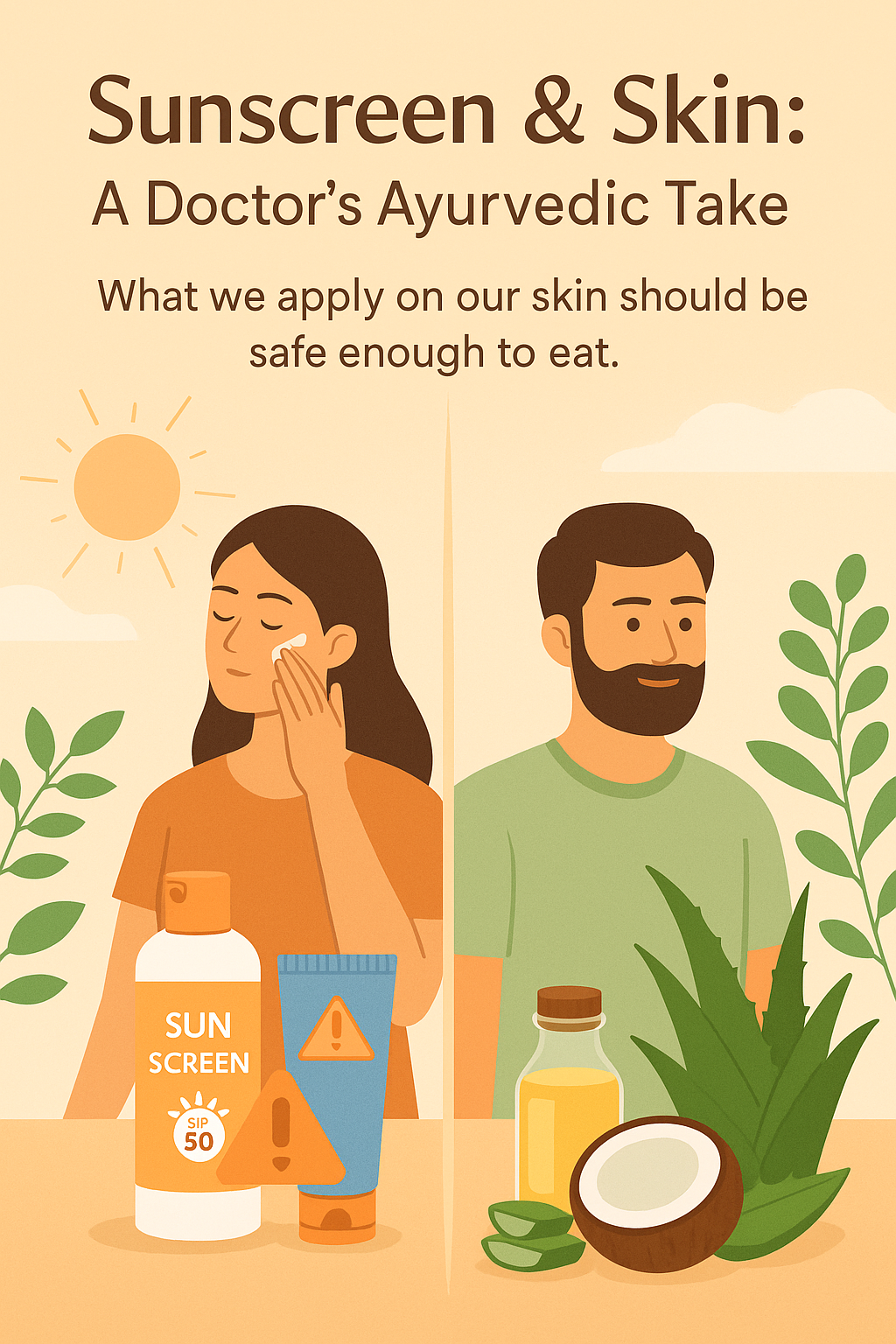As a physician with a strong foundation in modern medicine and a deep reverence for Ayurveda, I often find myself walking the beautiful bridge between science and nature. One topic where this dual perspective becomes especially relevant is the use of sunscreens.
Over the years, sunscreen has been hailed as a must-have product to prevent skin cancer, premature aging, and sun damage. While its role in protecting against UV-induced harm is valid, emerging research, personal observation, and Ayurvedic wisdom raise important questions about what we are applying to our skin every single day.
🔹 The Problem with Conventional Sunscreens
❌ 1. Chemical Overload on the Skin
Many commercial sunscreens contain chemical UV filters such as:
- Oxybenzone
- Avobenzone
- Octinoxate
- Homosalate
These are effective at absorbing harmful UV rays, but they also have the ability to penetrate the skin and enter the bloodstream. Studies have found these chemicals in urine, blood, and even breast milk within hours of application.
❌ 2. Hormonal Disruption & Toxicity
Certain chemical filters like oxybenzone have been shown to mimic estrogen and interfere with hormone signaling. Animal studies and some human evidence suggest a possible link to hormonal imbalance, reproductive toxicity, and altered thyroid function.
❌ 3. Skin Sensitivities & Allergies
Chemical sunscreens can cause:
- Contact dermatitis
- Stinging sensations
- Redness and inflammation especially in sensitive individuals or those with existing skin conditions.
❌ 4. Environmental Harm
Oxybenzone and octinoxate are known to be toxic to coral reefs, contributing to bleaching and DNA damage in marine life. This has led to bans in places like Hawaii and Palau.
🌿 What Ayurveda Teaches Us
In Ayurveda, the skin (called Twacha) is considered a mirror of internal health. It is also regarded as highly absorptive, which is why medicinal oils (taila), herbs, and lepas (masks) are applied to treat systemic conditions.
If we wouldn’t eat something, Ayurveda teaches us to question whether we should put it on our skin.
Instead of harsh chemicals, Ayurveda recommends:
- Cold-pressed oils (like coconut, sesame, and almond)
- Herbs like manjistha, neem, sandalwood, and aloe vera
- Sun protection through lifestyle: seeking shade, avoiding midday sun, and wearing protective clothing
🌞 Is Sun Exposure Always Harmful?
Not at all. In fact, moderate sun exposure is essential for:
- Vitamin D synthesis
- Boosting mood and immunity
- Maintaining circadian rhythm
However, the widespread and excessive use of high-SPF chemical sunscreens may inadvertently contribute to Vitamin D deficiency, especially in populations that already get limited sunlight exposure due to indoor lifestyles or cultural clothing practices. Studies suggest that while real-world sunscreen use rarely eliminates Vitamin D synthesis completely, prolonged and frequent application—especially without intentional sun exposure—can lower Vitamin D levels.
Ayurveda encourages early morning sunlight (up to 10 AM) for health benefits while cautioning against exposure during peak heat hours (10 AM–4 PM).
✅ A Balanced Approach to Sun Protection
If you’re not a fan of conventional sunscreen (like me), here’s how you can protect your skin naturally:
👉 Choose mineral-based sunscreens:
Look for ingredients like zinc oxide or titanium dioxide. These sit on the skin’s surface and reflect UV rays without being absorbed.
👉 Limit sun exposure during peak hours:
Wear hats, scarves, sunglasses, and cotton sleeves when stepping out.
👉 Nourish your skin from within:
Foods rich in antioxidants, omega-3 fatty acids, and hydrating fruits help your skin naturally combat UV damage.
👉 Apply edible, skin-safe oils:
Coconut oil, aloe vera gel, and raspberry seed oil have mild SPF properties (though not a replacement for broad-spectrum protection).
📊 Final Thoughts
As a doctor and a mother, I understand the desire to protect ourselves and our families from sun damage. But I also believe that blanket sunscreen use without understanding the ingredients is not the only way. By aligning scientific insight with Ayurvedic wisdom, we can find a more conscious, skin-loving path.
Remember: If it’s not safe to eat, it may not be safe to apply.
Let’s protect our skin—without poisoning our bodies or the planet.
📚 References
- Suh S, Pham C, Smith J, Mesinkovska NA. The banned sunscreen ingredients and their impact on human health: a systematic review. Int J Dermatol. 2020 Sep;59(9):1033-1042.
- Downs CA, Kramarsky-Winter E, Segal R, Fauth J, Knutson S, Bronstein O, Ciner FR, Jeger R, Lichtenfeld Y, Woodley CM, Pennington P, Cadenas K, Kushmaro A, Loya Y. Toxicopathological Effects of the Sunscreen UV Filter, Oxybenzone (Benzophenone-3), on Coral Planulae and Cultured Primary Cells and Its Environmental Contamination in Hawaii and the U.S. Virgin Islands. Arch Environ Contam Toxicol. 2016 Feb;70(2):265-88.
- Schlumpf M, Cotton B, Conscience M, Haller V, Steinmann B, Lichtensteiger W. In vitro and in vivo estrogenicity of UV screens. Environ Health Perspect. 2001 Mar;109(3):239-44. doi: 10.1289/ehp.01109239. Erratum in: Environ Health Perspect. 2001 Nov;109(11):A517.
- Neale RE, Khan SR, Lucas RM, Waterhouse M, Whiteman DC, Olsen CM. The effect of sunscreen on vitamin D: a review. Br J Dermatol. 2019 Nov;181(5):907-915.

Akanksha Sharma
Dr. Akanksha Sharma, Head Writer and creator of AtoZ of Pregnancy, is dedicated to empowering women, parents, and families through 360-degree knowledge. She and her team provide evidence-based advice to guide families through pregnancy, parenting and beyond.






